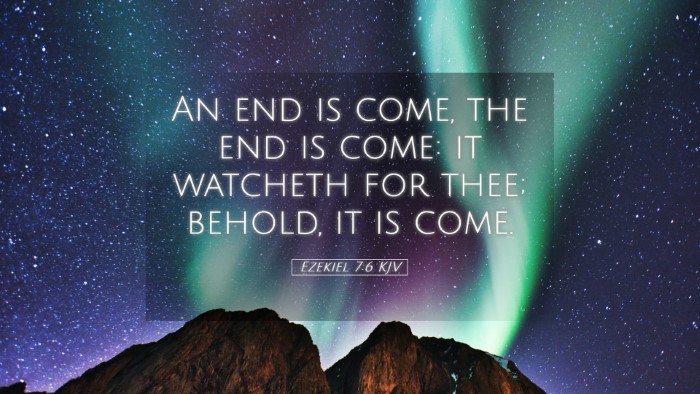Ezekiel 7:6 Commentary
Verse: "An end is come, the end is come: it watcheth for thee; behold, it is come." (Ezekiel 7:6, KJV)
Overview of the Context
This verse is situated within a prophetic warning delivered by Ezekiel, emphasizing the inevitable execution of God's judgment upon Israel due to their persistent unfaithfulness and revolt against Him. This proclamation signifies not just a temporal end but a definitive cessation of life as they knew it, marking a transition to a phase of divine retribution.
Insights from Public Domain Commentaries
Matthew Henry's Commentary
Matthew Henry elucidates that this verse encapsulates the message of impending doom and the certainty of God's decrees. He points out the duplication in the phrase "an end is come" to stress the finality of the judgment. According to Henry, God's judgment is thorough and decisive, symbolizing that the time for repentance has elapsed. He emphasizes that the watchful eye of the Almighty observes the moral decay, and the waits for the decisive moment of execution of His judgment.
Albert Barnes' Notes
Albert Barnes echoes Henry’s sentiments, emphasizing the idea of "watching" as depicting God's vigilance over His people. Barnes elucidates that the phrase "it watcheth for thee" indicates that judgment is not a haphazard occurrence but rather a planned and awaited judgment. This illustrates the importance of heeding divine warnings, as they signify a serious intention from God to address wickedness. Barnes highlights the term "behold," urging the reader to grasp the urgency of the moment and to comprehend that the time for mercy has run out.
Adam Clarke's Commentary
Adam Clarke addresses the sociopolitical implications of this passage, noting that the warnings from Ezekiel are not merely spiritual but are rooted in the socio-economic conditions of Israel. He argues that "an end is come" refers to the collapse of societal structures as a result of divine abandonment due to idolatry and immorality. Clarke remarks that this verse serves as a dire warning, reminding leaders and theologians of the destructive outcomes of disobedience to God’s laws. Furthermore, he emphasizes the importance of recognizing God's justice and the inevitability of judgment as components of His nature.
Thematic Considerations
Thematically, Ezekiel 7:6 serves as a stark reminder of God's holiness and justice. The repeated call of "an end is come" may be seen as the climax of divine patience, illustrating that God's long-suffering does reach a boundary. The passage is rich in its implication of accountability for one's actions, especially for a nation that has experienced God's grace and kindness. The dual focus on the immediacy of judgment juxtaposed with the pleas for righteousness serves as a call for both introspection and repentance.
Reflection for Today's Believers
For modern believers, Ezekiel 7:6 is a poignant exhortation to recognize the seriousness of sin and its consequences. The text is as relevant today as it was in the time of Ezekiel, calling individuals and communities to introspect regarding their spiritual standing before God. The certainty expressed in this verse encourages a sense of urgency in addressing spiritual deficiencies and a call to embrace a life of fidelity to God's commands.
Practical Applications
- Pastoral Care: Pastors should be mindful to address the implications of sin within the community and encourage ongoing repentance and restoration.
- Teachings for Students: The verse serves as a fundamental lesson in the importance of accountability to God’s standards, enriching theological education with the emphasis on judgment and mercy.
- Theological Reflection: Scholars can explore the attributes of God as seen through the lens of judgment, discussing the balance between justice and mercy in the character of God.
Conclusion
In conclusion, Ezekiel 7:6 profoundly communicates the finality of judgment while urging a recognition of God’s perpetual watchfulness over human affairs. The message contained within this verse remains a vital reflection for contemporary society, challenging believers to heed divine warnings and seek a true relationship with their Creator. It emphasizes the inevitability of divine justice and the urgent call to repentance, therefore serving as a powerful tool for spiritual growth and awareness.


